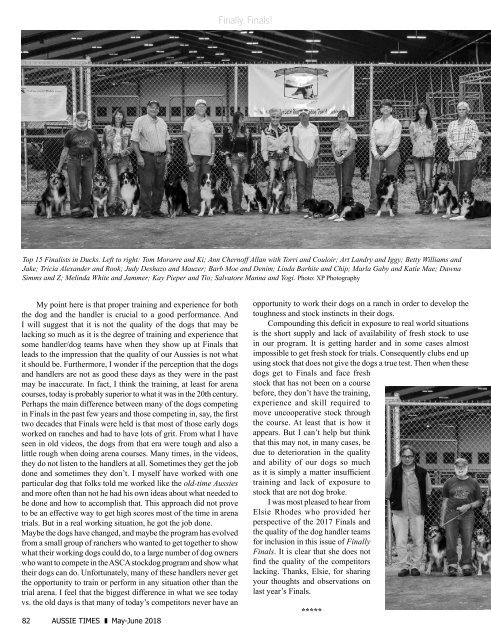2018 May June
Create successful ePaper yourself
Turn your PDF publications into a flip-book with our unique Google optimized e-Paper software.
Finally, Finals!<br />
Top 15 Finalists in Ducks. Left to right: Tom Morarre and Ki; Ann Chernoff Allan with Torri and Couloir; Art Landry and Iggy; Betty Williams and<br />
Jake; Tricia Alexander and Rook; Judy Deshazo and Mauzer; Barb Moe and Denim; Linda Barhite and Chip; Marla Gaby and Katie Mae; Dawna<br />
Simms and Z; Melinda White and Jammer; Kay Pieper and Tio; Salvatore Manna and Yogi. Photo: XP Photography<br />
My point here is that proper training and experience for both<br />
the dog and the handler is crucial to a good performance. And<br />
I will suggest that it is not the quality of the dogs that may be<br />
lacking so much as it is the degree of training and experience that<br />
some handler/dog teams have when they show up at Finals that<br />
leads to the impression that the quality of our Aussies is not what<br />
it should be. Furthermore, I wonder if the perception that the dogs<br />
and handlers are not as good these days as they were in the past<br />
may be inaccurate. In fact, I think the training, at least for arena<br />
courses, today is probably superior to what it was in the 20th century.<br />
Perhaps the main difference between many of the dogs competing<br />
in Finals in the past few years and those competing in, say, the first<br />
two decades that Finals were held is that most of those early dogs<br />
worked on ranches and had to have lots of grit. From what I have<br />
seen in old videos, the dogs from that era were tough and also a<br />
little rough when doing arena courses. Many times, in the videos,<br />
they do not listen to the handlers at all. Sometimes they get the job<br />
done and sometimes they don’t. I myself have worked with one<br />
particular dog that folks told me worked like the old-time Aussies<br />
and more often than not he had his own ideas about what needed to<br />
be done and how to accomplish that. This approach did not prove<br />
to be an effective way to get high scores most of the time in arena<br />
trials. But in a real working situation, he got the job done.<br />
<strong>May</strong>be the dogs have changed, and maybe the program has evolved<br />
from a small group of ranchers who wanted to get together to show<br />
what their working dogs could do, to a large number of dog owners<br />
who want to compete in the ASCA stockdog program and show what<br />
their dogs can do. Unfortunately, many of these handlers never get<br />
the opportunity to train or perform in any situation other than the<br />
trial arena. I feel that the biggest difference in what we see today<br />
vs. the old days is that many of today’s competitors never have an<br />
82 AUSSIE TIMES <strong>May</strong>-<strong>June</strong> <strong>2018</strong><br />
opportunity to work their dogs on a ranch in order to develop the<br />
toughness and stock instincts in their dogs.<br />
Compounding this deficit in exposure to real world situations<br />
is the short supply and lack of availability of fresh stock to use<br />
in our program. It is getting harder and in some cases almost<br />
impossible to get fresh stock for trials. Consequently clubs end up<br />
using stock that does not give the dogs a true test. Then when these<br />
dogs get to Finals and face fresh<br />
stock that has not been on a course<br />
before, they don’t have the training,<br />
experience and skill required to<br />
move uncooperative stock through<br />
the course. At least that is how it<br />
appears. But I can’t help but think<br />
that this may not, in many cases, be<br />
due to deterioration in the quality<br />
and ability of our dogs so much<br />
as it is simply a matter insufficient<br />
training and lack of exposure to<br />
stock that are not dog broke.<br />
I was most pleased to hear from<br />
Elsie Rhodes who provided her<br />
perspective of the 2017 Finals and<br />
the quality of the dog handler teams<br />
for inclusion in this issue of Finally<br />
Finals. It is clear that she does not<br />
find the quality of the competitors<br />
lacking. Thanks, Elsie, for sharing<br />
your thoughts and observations on<br />
last year’s Finals.<br />
*****



